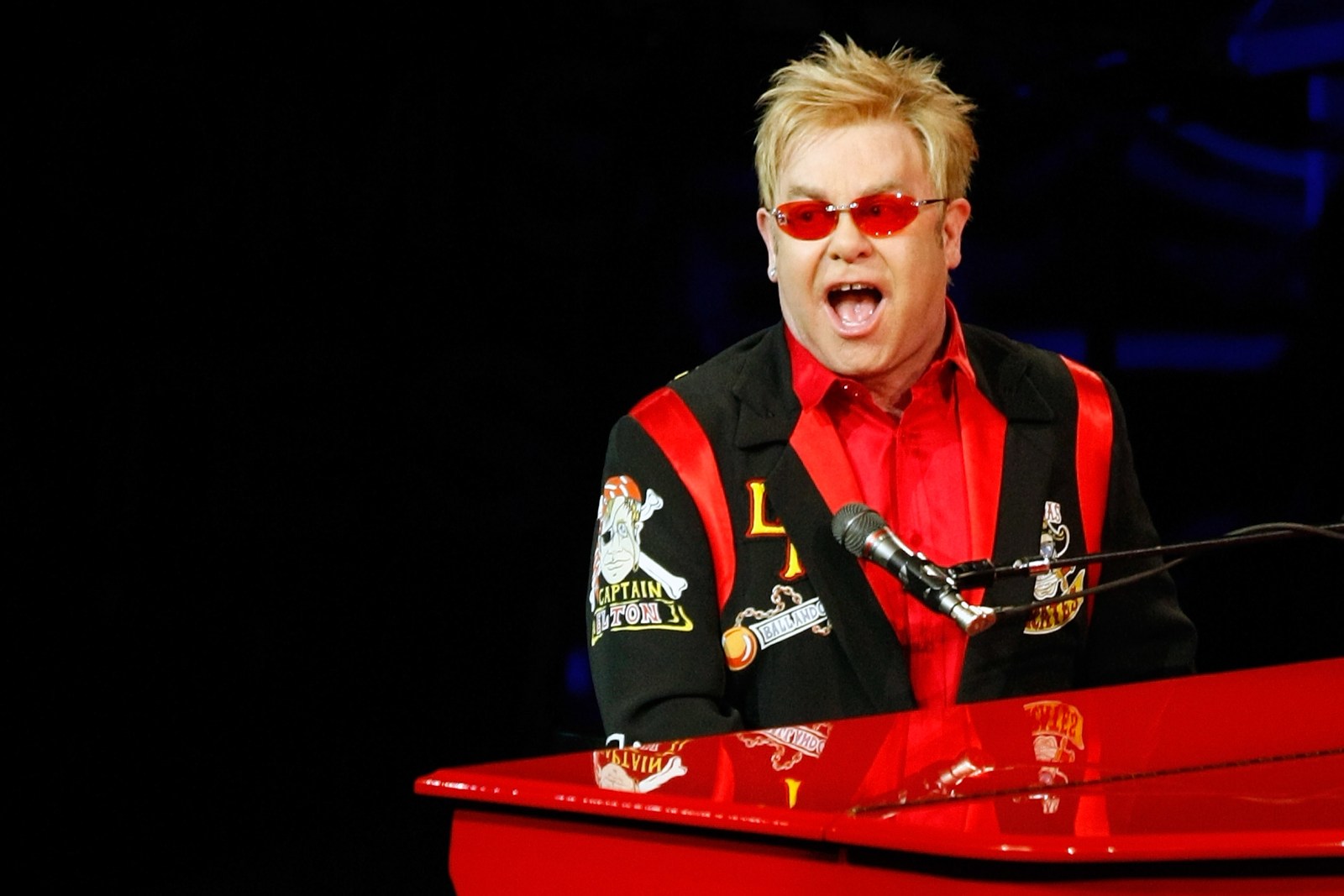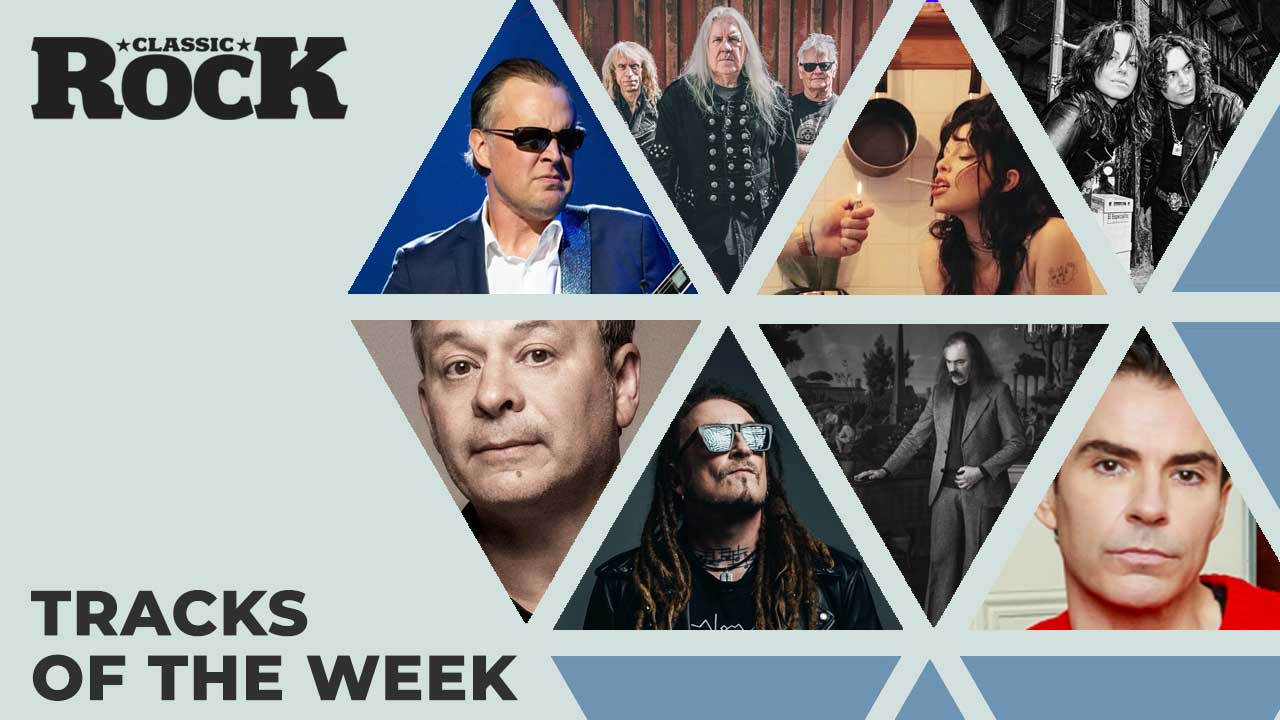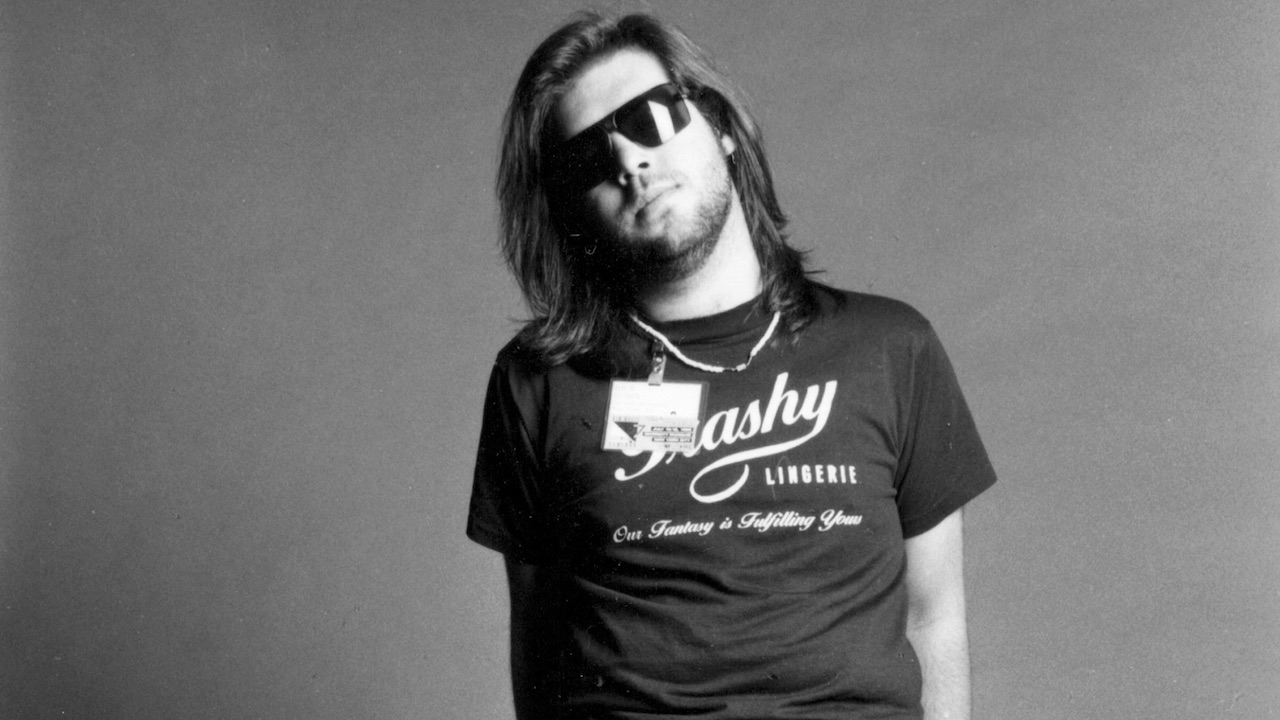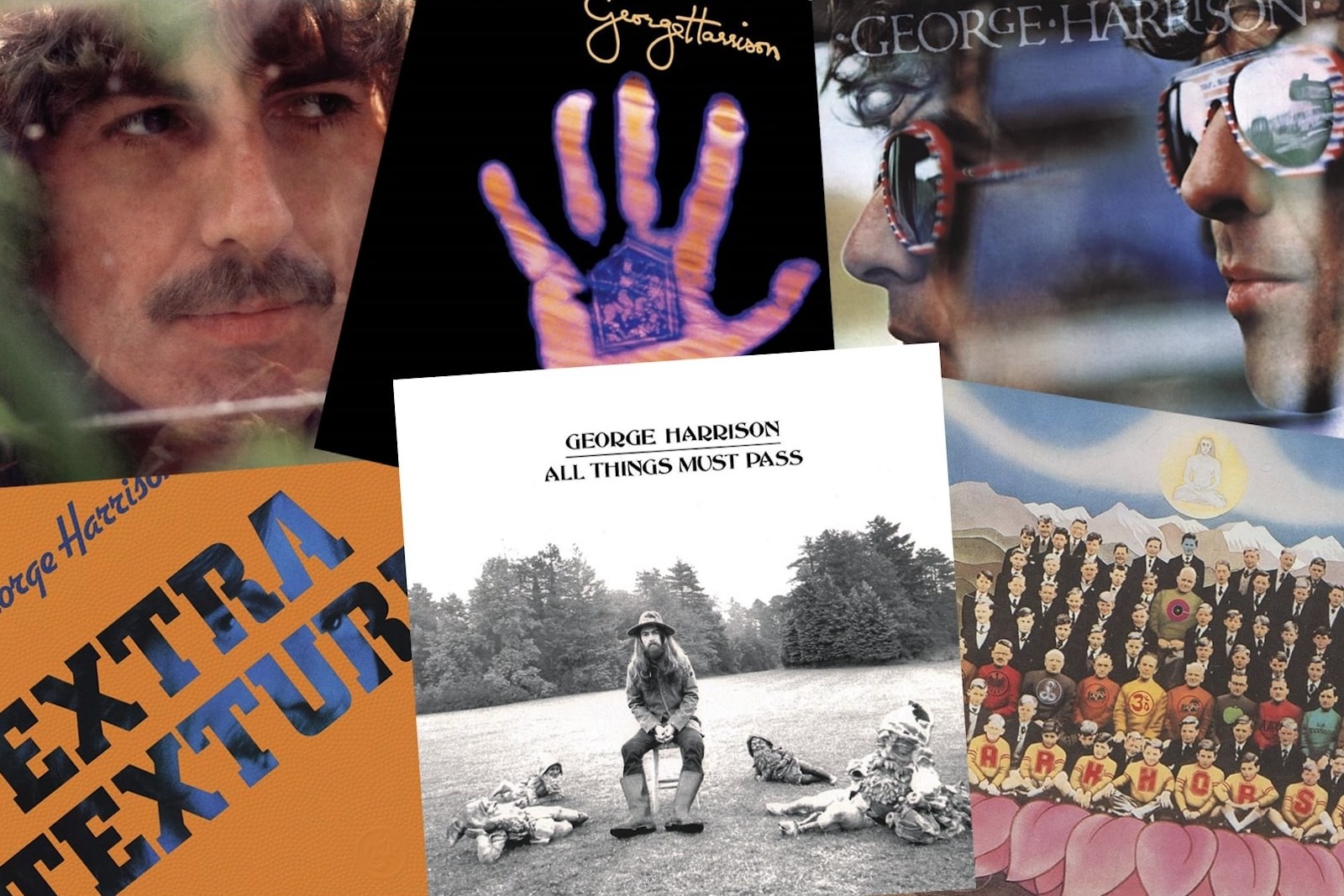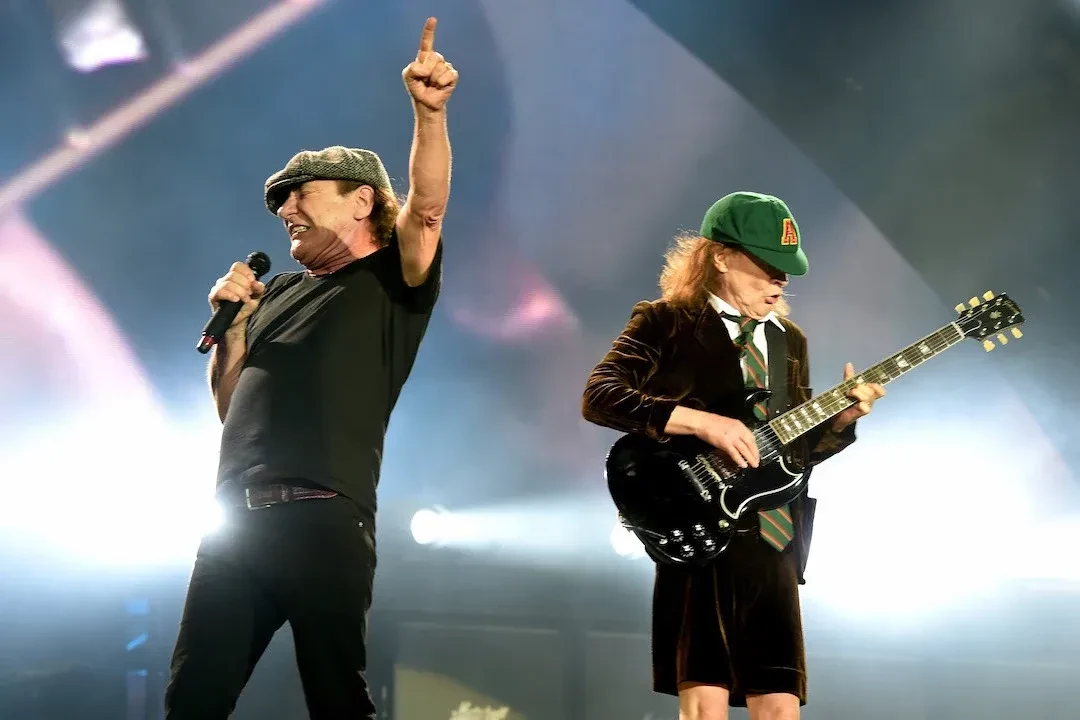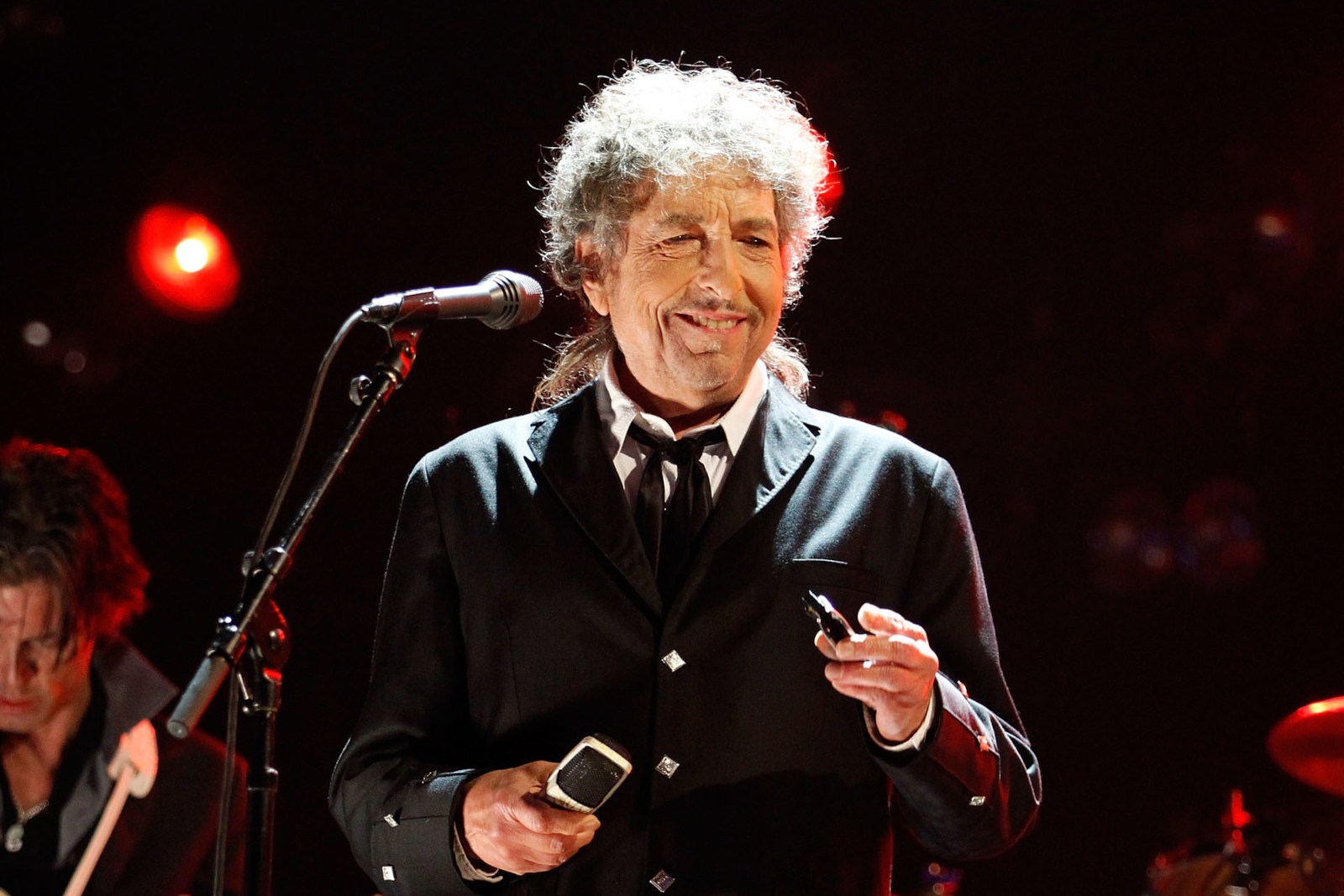Everybody knows how George Harrison started the ’70s: His seven-times platinum international chart-topping triple album All Things Must Pass reeled off the No. 1 “My Sweet Lord” in the wake of the Beatles‘ split.
Less known, though they should be, are underrated later gems like 1976’s Thirty Three & 1/3 and Harrison’s self-titled 1979 album. They spawned a trio of Top 30 hits (“This Song,” “Crackerbox Palace” and “Blow Away”), but will never be as ubiquitous as the triple-album behemoth that began the decade.
In between, Harrison had some highs (1973’s Living in the Material World and its chart-topping single “Give Me Love,” after a guest-packed charity concert and album) and some lows (1975’s decidedly uneven Extra Texture, a plagiarism scandal). The following list of Top 25 George Harrison ’70s Songs aims to put it all in perspective.
READ MORE: Ranking Every Beatles Live Album
Extra Texture even gets a little love. So do a number of deeper cuts that never found their way onto radio playlists or jukeboxes with other Top 40 solo hits like “What Is Life,” “Dark Horse” and “You.” Of course, the 23-song All Things Must Past provided a deep well of material, but his other ’70s LPs yielded their own musical delights, too.
Harrison made an impressive entrance into the next decade with the No. 2 smash “All Those Years Ago,” a 1981 tribute to fallen bandmate John Lennon, but ended up going through a creative dry spell. He’d never be this musically active again.
There was a belated return to the top of the charts in the late ’80s with a sparkling cover of “Got My Mind Set on You,” the platinum-selling international Top 10 LP Cloud Nine and his all-star Traveling Wilburys projects. Only one more Harrison album followed, however, 2002’s posthumously released Brainwashed.
In this way, songs from his first decade as a solo act will always represent a golden era in George Harrison’s career – and these are the 25 best:
No. 25. “Be Here Now”
From: Living in the Material World (1973)
This feels like the quiet, and then soaringly meditative song Harrison was trying to make with the Beatles on the White Album‘s interminable “Long, Long, Long.” Featuring a drone played on the tanpura, “Be Here Now” was titled after one of Harrison’s favorite books by Baba Ram Dass. He completed things with a foresighted call for presence that arrived decades before the proliferation of cellphone distractions.
No. 24. “Woman Don’t You Cry for Me”
From: Thirty Three & 1/3 (1976)
Harrison began work on “Woman Don’t You Cry for Me” during his guest turn on a Delaney and Bonnie tour held after Abbey Road arrived but before the Beatles officially split. This track briefly became a contender for All Things Must Pass, and then was shelved for years. By that point, the song’s principal innovation had become old hat: This was the first time Harrison tried out slide guitar.
No. 23. “So Sad”
From: Dark Horse (1974)
“So Sad” was actually an outtake from Living in the Material World, and it’s got the same elegiac tone. Ringo Starr took part in the original session, where Harrison delved into the wreckage of his complicated relationship with Pattie Boyd. Perhaps thinking better of being so nakedly honest, Harrison sat on “So Sad” for a while. By the time it finally appeared on Dark Horse, Alvin Lee of Ten Years After had already released his own version.
No. 22. “If Not For You”
From: All Things Must Pass (1970)
A cover from Bob Dylan‘s New Morning album, “If Not For You” became another intimate, atmospheric aside that nicely counterbalanced the excesses found elsewhere on All Things Must Pass. Alan White, who played drums during the sessions, said Lennon provided some uncredited guitar work. Later it was basically ruined by Olivia Newton-John.
No. 21. “Sue Me, Sue You Blues”
From: Living in the Material World (1973)
He’d released a multiplatinum solo debut and staged a signature all-star charity show, but three years later Harrison was still in court trying to shake free of the Beatles. That prompted one of his sharpest, most Lennon-esque takedowns – complete with the same plucky dobro sound Harrison employed on his former bandmate’s “Crippled Inside.”
No. 20. “Isn’t It a Pity (Version Two)”
From: All Things Must Pass (1970)
Harrison’s second version of “Isn’t It a Pity” followed its original contours as a rejected demo for the Beatles, with Phil Spector‘s epic production touches replaced by a more intimate atmosphere that allowed Eric Clapton‘s guitar to move closer to the listener. The appearance of the Leslie recalled sessions for Abbey Road, too.
No. 19. “The Lord Loves the One (That Loves the Lord)”
From: Living in the Material World (1973)
You’d be forgiven for expecting another anodyne paean to Krishna teachings. Instead, Harrison stormed through this album’s earthiest, most muscular attack, highlighted by one of his finest slide performances.
No. 18. “Ballad of Sir Frankie Crisp (Let It Roll)”
From: All Things Must Pass (1970)
Harrison takes us along on a travelogue through the mystical, humorous and quite charming Friar Park, the Victorian Gothic mansion in Henley-on-Thames once owned by Crisp.
No. 17. “Behind That Locked Door”
From: All Things Must Pass (1970)
Originally aimed at Dylan, as he planned a huge comeback appearance with the Band at the Isle of Wight Festival, “Behind That Locked Door” became a stirring message of encouragement that we all can use from time to time.
No. 16. “Don’t Let Me Wait Too Long”
From: Living in the Material World (1973)
The impish original working title of this deeply religious album was The Magic Is Here Again, which – even as a joke – was guaranteed to be an overpromise after Harrison’s triple-album debut. Still, “Don’t Make Me Wait Too Long” was one of the times when his long-awaited studio follow-up approached that kind of hyperbole. A masterpiece of coiled anticipation.
No. 15. “Run of the Mill”
From: All Things Must Pass (1970)
The emotional toll of the Beatles’ troubles was writ large during a song Harrison initially composed before they reassembled for Abbey Road. Spector actually allowed for a rootsy, Band-like structure in a moment of surprising restraint later underscored when one of Harrison’s initial run-throughs appeared on 2012’s Early Takes Vol. 1. Spector didn’t add much; he didn’t have to.
No. 14. “This Song”
From: Thirty Three & 1/3 (1976)
Harrison had much more success when he hilariously lampooned the whole “My Sweet Lord” legal mess rather than trying to reverse-engineer a solution by removing some parts for the 2001 reissue of All Things Must Pass.
No. 13. “You”
From: Extra Texture [Read All About It] (1975)
Harrison had returned to drink and drugs, and Extra Texture couldn’t have strayed further from his religious moorings — or from the free-spirited uplift that made his initial post-Beatles records such pleasant surprises. This Top 20 U.S. hit – actually a relic from a scrapped 1971 solo album by Ronnie Spector – takes you right back. Still, it says a lot when the best thing on an LP is essentially a table scrap.
No. 12. “Love Comes to Everyone”
From: George Harrison (1979)
He should know. Harrison completed this song in early 1978, after some time away. He’d marry Olivia Arias and then become father to Dhani during the sessions for a self-titled comeback album. Clapton and Steve Winwood stopped by his home studio to complete things.
No. 11. “I’d Have You Anytime”
From: All Things Must Pass (1970)
Every bit as moving as Abbey Road triumphs like “Something,” with a Beatle-ish guitar signature and lyrical assist by Bob Dylan. What a gutsy opening song for such an enormous undertaking.
No. 10. “Crackerbox Palace”
From: Thirty-Three and a Third (1976)
The album’s title was a take-off on the RPMs for vinyl and Harrison’s age on the proposed release date, and it held great playful promise. Only the record wasn’t released until his 33 2/3 birthday, in a preview of looming label issues. Too bad, since Thirty-Three and a Third was a vast improvement over Extra Texture, highlighted by this incredibly fun Top 20 hit. “Crackerbox Palace” was about the estate of friend Lord Buckley, putting an expectedly different spin (for Harrison anyway) on the line: “Know that the Lord is well.”
No. 9. “All Things Must Pass”
From: All Things Must Pass (1970)
Harrison initially gave “All Things Must Pass” to Billy Preston when the Beatles rejected it. By the time Preston’s version arrived in September 1970, Harrison had thankfully decided to reclaim this track. Like “Run of the Mill,” his subsequent update was influenced by the the Band’s recent Music From Big Pink.
No. 8. “Let It Down”
From: All Things Must Pass (1970)
Look at Harrison, establishing the loud/soft approach that would define alternative rock back when all of those flannel-wearing guys were still twinkles in their pop’s eyes.
No. 7. “Blow Away”
From: George Harrison (1979)
A soul-lifting track about clearing skies and opening hearts that’s aged as well as any solo Beatles single. Maybe better.
No. 6. “My Sweet Lord”
From: All Things Must Pass (1970)
Docked several spots because he lost that court case. An American publishing company famously won a $600,000 judgment after claiming that it sounded too much like the early ’60s hit “He’s So Fine.” The court ruled that Harrison “subconsciously plagiarized” the song. Oddly, Harrison countered that he had, in fact, stolen it – but not from the Chiffons. Instead, he said it was originally inspired by Edwin Hawkins Singers’ “Oh Happy Day.”
No. 5. “Isn’t It a Pity (Version One)”
From: All Things Must Pass (1970)
Harrison just wouldn’t give up on this one. “Isn’t It a Pity” was notably tried during January 1969 Beatles sessions under the not-very-intriguing title of “George’s Demo.” (Perhaps unsurprisingly, it went nowhere.) At that point, he’d apparently been fooling around with some form of this song since the Revolver period. When he finally got a chance to record it, Harrison paired the frankly titanic first version of “Isn’t It a Pity” with “My Sweet Lord” to create his double A-side debut solo single.
No. 4. “Your Love Is Forever”
From: George Harrison (1979)
Harrison spent some time puttering around the grounds during his time away from the music business. “I like gardens; I like the pleasure they give you,” he told Rolling Stone back then. “It’s like a meditation in a way.” This sense of contentment permeated the small-scale, endlessly charming LP which followed, and “Your Love Is Forever” was its heart and soul. Harrison employs an era-appropriate cycle of seasonal metaphors to craft one of his most truly enduring ballads, then completes things with some of his loveliest slide work.
No. 3. “Beware of Darkness”
From: All Things Must Pass (1970)
“Beware of Darkness” originally opened Side Three of Harrison’s post-Fab creative outburst, capturing both the mood and the moment in a reserved, and very Harrison-esque manner. It’s a showcase for his fellow musicians, as sessions evolved into loose amalgams overseen by the mercurial Spector. Yet, Harrison remains the center point, as he matches a lyrical meditation on overcoming life’s harder moments (he simply refuses to give into “the pain that often lingers“) with an arrangement that might draw this album’s clearest line back to the Beatles.
No. 2. “What Is Life”
From: All Things Must Pass (1970)
A towering rocker from Harrison’s six-times platinum-selling solo debut, “What Is Life” actually warranted Spector’s Wall of Sound approach. He ended up assembling a who’s-who session: Badfinger added extra layers to a sweeping exclamation of passion, while the background vocals were credited to the George O’Hara-Smith singers — Bobby Whitlock and Clapton, the future nucleus of Derek and the Dominos. Predictably, the results couldn’t be more widescreen – and yet “What Is Life” never loses its sense of intimate joy.
No. 1. “Give Me Love (Give Me Peace On Earth)”
From: Living in the Material World (1973)
In a way, there wasn’t any other direction to go but smaller. After all, Harrison had already reached No. 1 in both the U.S. and U.K. with the expansive “My Sweet Lord,” then organized a huge Bangladesh benefit concert. So he gathered a tightly knit quartet of confidants – only Gary Wright, Klaus Voormann, Jim Keltner and Nicky Hopkins were on hand – to record something Harrison later described as “a prayer and personal statement between me, the Lord and whoever likes it.” Turns out everybody did. Harrison’s ever-expressive slide took center stage, rather than a tsunami of sidemen, while his message became more direct. All of it worked in tandem to render universal truths about healing and forgiveness. Oh, and it was another No. 1 song.
Beatles Solo Albums Ranked
Included are albums that still feel like time-stamped baubles and others that have only grown in estimation.
Gallery Credit: Nick DeRiso
You Think You Know the Beatles?


